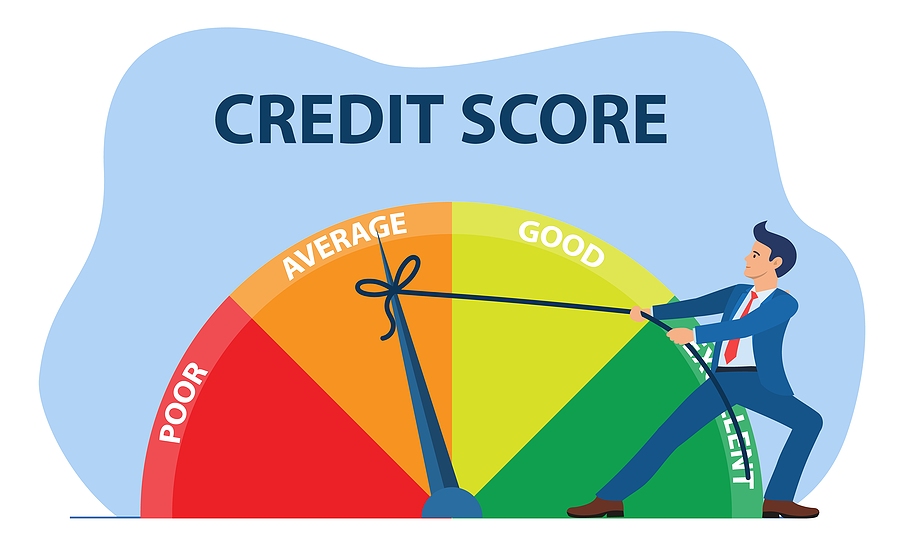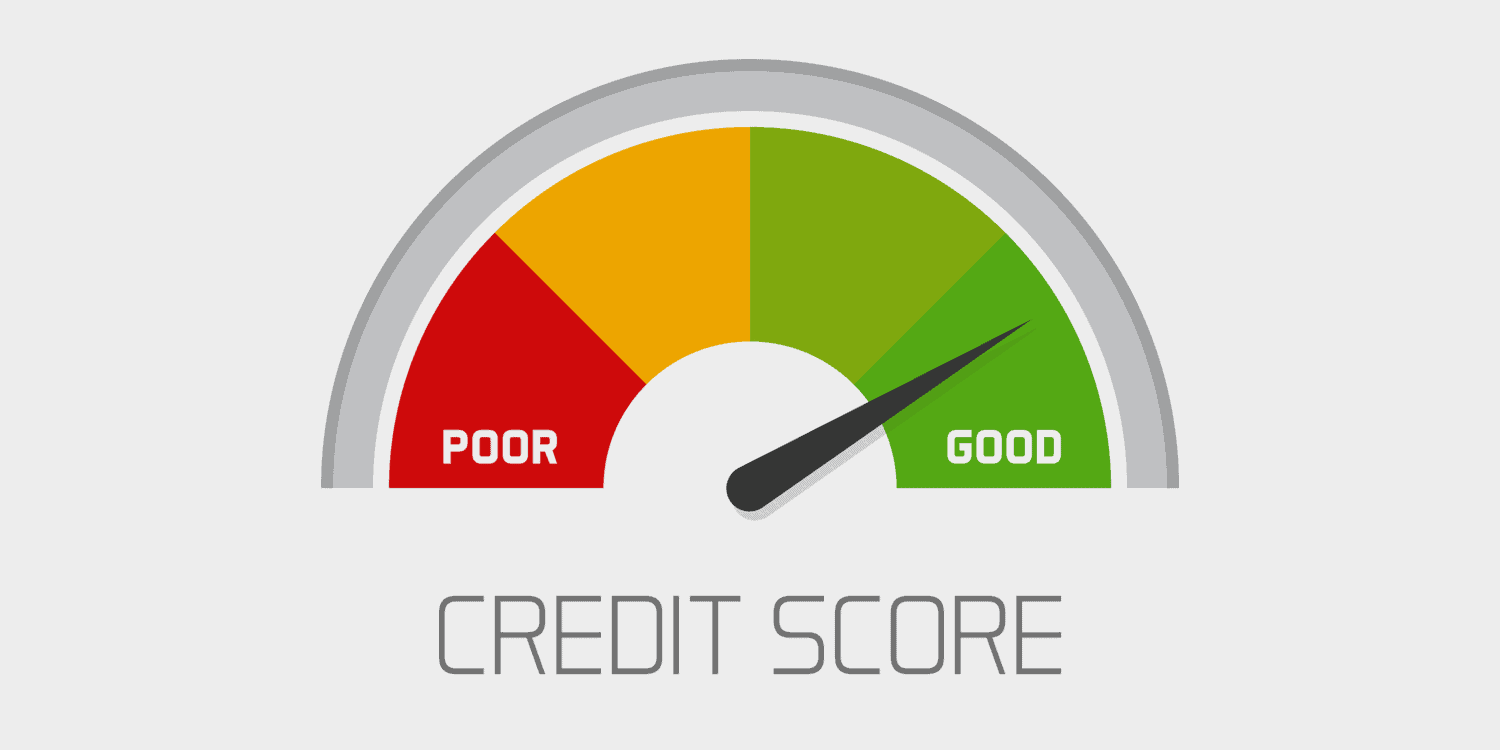What is a credit score?
A credit score is a numerical representation of an individual’s creditworthiness. It is based on information contained in a credit report and is used by lenders to determine whether to approve a loan and what terms to offer. Credit scores are typically used by lenders to assess the risk of lending money to an individual. It is worth noting that there is no ‘official’ credit score in the UK and different credit rating agencies will score you on a different scale. How financial institutions use or not use these scores is up to individual businesses.
In the UK, credit scores are calculated based on information contained in an individual’s credit report, which is a record of their credit history. The credit report contains information about an individual’s credit accounts, including credit card accounts, loans, and mortgages. It also includes information about payments made on these accounts, as well as any bankruptcies, court judgments, or other negative information.
Credit scores are typically expressed as a number on a scale, with a higher score indicating a lower level of risk. Different credit scoring models may have different scales and lenders use credit scores to assess the risk of lending money to an individual. They may use a credit score as one factor in determining whether to approve a loan and what terms to offer. For example, an individual with a high credit score may be offered a lower interest rate on a loan than someone with a lower credit score.

Why is a credit score important?
Your credit score is a numerical representation of your creditworthiness. It’s used by lenders, landlords, and other organizations to determine how likely you are to repay a loan or credit card, or to pay your bills on time.
A high credit score can be beneficial because it can make it easier for you to get approved for credit products, such as credit cards, loans, and mortgages. It may also help you get approved for rental properties, and may result in lower insurance premiums.
On the other hand, a low credit score can make it more difficult to get approved for credit, and you may be charged higher interest rates if you are approved. A low credit score can also make it more difficult to get approved for rental properties and may result in higher insurance premiums.
Overall, your credit score is an important factor in your financial life, as it can affect your ability to access credit and other financial products, and can have an impact on the terms and conditions you are offered.
How can I improve my credit score?
There are several steps you can take to improve your credit score:
- Make sure you’re on the electoral roll at your current address. This helps lenders confirm your identity and check that you’re a UK resident.
- Check your credit report for errors and dispute any mistakes. You can get a free copy of your credit report from one of the UK’s credit reference agencies: Equifax, Experian, or TransUnion.
- Pay your bills on time. Late or missed payments can have a negative impact on your credit score.
- Use credit responsibly. Avoid maxing out your credit cards or taking on too much debt. Instead, try to use a small portion of your available credit and pay off your balances in full each month.
- Consider getting a credit-builder credit card or loan. These are designed for people with poor or limited credit history and can help you build up a positive credit score if you use them responsibly.
- Be wary of credit repair companies. Some companies promise to improve your credit score for a fee, but many of these services are scams. There are no quick fixes for improving your credit score – it takes time and effort to establish a good credit history.

Improve credit score by getting on the electoral roll.
Yes, being on the electoral roll at your current address can help improve your credit score. When you register to vote, your name, address, and date of birth are added to the electoral roll. This information is then used by lenders to confirm your identity and check that you’re a UK resident. By adding your name to the electoral roll, you’re helping to establish your credit history and show that you are a responsible borrower. To register to vote in the UK, you can visit the website of your local electoral registration office or contact your local council.
Improve your credit score by not applying for too many financial products in a six month period.
Yes, applying for too many financial products in a short period of time can have a negative impact on your credit score. This is because each time you apply for credit, the lender will perform a “hard inquiry” on your credit report. A hard inquiry is a record of the fact that you applied for credit, and it can stay on your credit report for up to two years. Having too many hard inquiries on your credit report in a short period of time can signal to lenders that you are taking on too much debt or that you are struggling to manage your finances. This can make lenders less likely to approve your application, which can in turn lower your credit score. To avoid this, try to limit the number of credit applications you make, especially if you know you’ll be applying for a mortgage or other major loan in the near future.
Improve your credit score by applying for a credit card.
Using a credit card responsibly can help improve your credit score. When you use a credit card, the lender reports your payment activity to the credit reference agencies, which is then included in your credit report. If you use your credit card responsibly, this can help improve your credit score. For example, if you make your payments on time and don’t exceed your credit limit, this can demonstrate to lenders that you are a responsible borrower and may increase your credit score.
However, it’s important to be careful when applying for a credit card, as applying for too many credit cards in a short period of time can have a negative impact on your credit score. Each time you apply for a credit card, the lender will perform a “hard inquiry” on your credit report, which can stay on your credit report for up to two years. Having too many hard inquiries on your credit report in a short period of time can signal to lenders that you are taking on too much debt or that you are struggling to manage your finances, which can lower your credit score. To avoid this, try to limit the number of credit card applications you make, especially if you know you’ll be applying for a mortgage or other major loan in the near future.
Improve your credit score by managing your credit utilisation
Managing your credit utilisation (also known as credit utilisation ratio) can help improve your credit score. Your credit utilization ratio is the amount of credit you’re using compared to the total amount of credit available to you. For example, if you have a credit card with a limit of £1,000 and you have a balance of £500, your credit utilization ratio is 50%.
It’s generally considered good practice to keep your credit utilization ratio below 30%. This means that you’re using a small portion of your available credit and are less likely to get into financial trouble. When you have a low credit utilization ratio, this can demonstrate to lenders that you are a responsible borrower and may increase your credit score.
To manage your credit utilisation ratio, you can do the following:
- Pay off your credit card balances in full each month
- Avoid maxing out your credit cards
- Consider requesting a credit limit increase (if you have a good credit history and are confident you can handle the additional credit)
By managing your credit utilization ratio, you can help improve your credit score and demonstrate to lenders that you are a responsible borrower.
Improve your credit score by NEVER missing a payment
Yes, making sure you never miss a payment is an important way to improve your credit score. Payment history is one of the most important factors that lenders consider when determining your credit score. If you have a history of making timely payments, this can demonstrate to lenders that you are a responsible borrower and may increase your credit score.
On the other hand, if you have a history of missing payments or making late payments, this can have a negative impact on your credit score. Late or missed payments can stay on your credit report for up to six years, and can make lenders less likely to approve your application for credit.
To ensure you never miss a payment, you can do the following:
- Set up automatic payments for your bills
- Use a calendar or phone reminder to remind you when payments are due
- Keep track of your due dates and make sure you have enough money in your account to cover your bills
By making sure you never miss a payment, you can help improve your credit score and demonstrate to lenders that you are a responsible borrower.
Maintain your credit score by keeping old credit open
Maintaining old credit accounts can help improve your credit score in some cases, but it’s important to consider the potential drawbacks as well. Here are some things to consider when deciding whether to keep old credit accounts open:
- Credit utilisation ratio: If you have a credit card that you no longer use, keeping it open may help improve your credit score by increasing the amount of credit available to you. This can lower your credit utilization ratio, which is the amount of credit you’re using compared to the total amount of credit available to you. A low credit utilisation ratio is generally considered good for your credit score.
- Credit history: Keeping old credit accounts open can also help improve your credit score by increasing the length of your credit history. A longer credit history can demonstrate to lenders that you have a track record of using credit responsibly.
- Annual fees: However, it’s important to consider any annual fees associated with the credit account. If you’re paying an annual fee for a credit card that you don’t use, it may not be worth keeping the account open.
Ultimately, whether or not it’s a good idea to keep old credit accounts open will depend on your individual circumstances. If you’re unsure whether to keep an old credit account open, you may want to consider consulting with a financial advisor or credit expert.
Check for errors on your report
Yes, it’s important to check your credit report for errors and dispute any mistakes you find. Credit reference agencies are responsible for maintaining your credit report and providing it to lenders when you apply for credit. However, credit reports are not always error-free, and it’s possible that mistakes or outdated information could appear on your report.
If you find errors on your credit report, you can dispute them by contacting the credit reference agency that provided the report. The credit reference agency will then investigate the mistake and make any necessary corrections to your report.
To check your credit report for errors, you can request a free copy of your credit report from one of the UK’s credit reference agencies: Equifax, Experian, or TransUnion. You are entitled to a free copy of your credit report from each agency once a year. You can also purchase a copy of your credit report for a fee.
By checking your credit report for errors and disputing any mistakes, you can help ensure that your credit report accurately reflects your credit history and improve your chances of being approved for credit.
Consider getting a credit builder card
A credit-builder credit card or loan can be a good option if you have poor or limited credit history and are looking to improve your credit score. Credit-builder products are designed specifically for people who are trying to establish or rebuild their credit.
With a credit-builder credit card, you’ll be given a small credit limit, which you can use to make purchases or withdraw cash. As you use the card and make your payments on time, the lender will report your payment activity to the credit reference agencies, which can help improve your credit score.
A credit-builder loan works in a similar way. You’ll be given a small loan, which you’ll need to repay in monthly installments. As you make your loan payments on time, the lender will report your payment activity to the credit reference agencies, which can help improve your credit score.
Credit-builder products can be a good option for people with poor or limited credit history, as they can help you build up a positive credit history and improve your credit score. However, it’s important to be aware that credit-builder products may have higher interest rates than other credit products, so it’s important to shop around and compare your options before applying.

Why Improving your credit score can have several benefits, including:
- Access to better credit products: Lenders use your credit score to determine how likely you are to repay a loan or credit card. If you have a high credit score, you may be able to qualify for credit products with lower interest rates, which can save you money in the long run.
- Lower insurance premiums: Some insurance companies use your credit score to determine your insurance premiums. If you have a high credit score, you may be able to get lower premiums on your insurance policies.
- Better rental or mortgage options: Landlords and mortgage lenders may check your credit score when evaluating your application. If you have a high credit score, you may be more likely to be approved for a rental or mortgage, and you may be able to negotiate better terms.
- Easier approval for utilities and other services: Some utility companies and other service providers may check your credit score when evaluating your application. If you have a high credit score, you may be more likely to be approved for these services.
Improving your credit score can also give you peace of mind and help you feel more financially secure, knowing that you have the option to borrow money if you need
Who are the main credit ratings agencies in the UK
There are three main credit ratings agencies in the UK: Experian, Equifax, and TransUnion (formerly known as Callcredit). These agencies collect and maintain credit information on individuals and businesses and provide credit reports and credit scores to lenders and other interested parties.
Experian is one of the largest credit ratings agencies in the UK and around the world. It offers a range of credit-related products and services, including credit reports and scores, identity theft protection, and credit monitoring.
Equifax is another major credit ratings agency in the UK. It provides credit reports, scores, and related services to consumers and businesses.
TransUnion is a credit ratings agency that was formed in 2018 through the merger of Callcredit and two other companies. It offers credit reports, scores, and other credit-related products and services in the UK.
All three of these agencies are regulated by the Financial Conduct Authority (FCA) in the UK and are required to follow certain rules and guidelines when collecting, using, and sharing credit information. All these sites offer the opportunity to see your credit score for free although they all charge additional feed for a detailed breakdown and other functionality.










Recent Comments